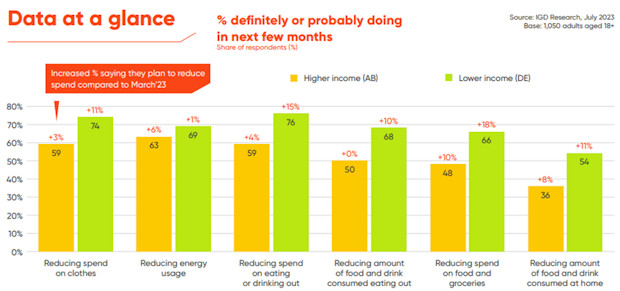The food and consumer goods industry in the UK is facing challenges on several fronts as the problem of persistent inflation is compounded by labour shortages and changing regulations.
July’s Economics Viewpoint Report from IGD outlines the spectrum of complex challenges business leaders face amid a landscape of low consumer confidence. The report suggests that the sector will require progressive leadership and a collaborative approach across the whole supply chain to adapt to these changes.
While wage growth remains strong, IGD’s analysis shows that, in real terms, UK households will struggle for some time, detailing how 66% of lower-income households are reducing spend on groceries and 54% are reducing the amount of food and drink consumed at home.
James Walton, Chief Economist at IGD, said: “We predict that food price inflation will slowly and steadily decline over the remainder of 2023, reaching approximately 9% by December. Although food price inflation appears to have peaked in March, widespread price cuts are unlikely at this time, and a depressed volume of sales is expected until March 2024.”
Added to this is a deficit of labour needed to keep the food supply chain moving. DEFRA’s recently published ‘Independent Review of Labour Shortages in the Food Supply Chain’ acknowledged the scope of the problem. The review also recognised IGD’s role in raising awareness of the range of employment opportunities within food and drink.
Walton added: “Labour pressures may be the industry’s Achilles’ heel, driving costs while undermining capacity. Resolving this is key to long-term industry resilience, and the focus on this issue will increase as it becomes more urgent. This comes as consumer confidence is low.”
Consumer research conducted for the new IGD report highlights the increased pressure on those with the lowest incomes, with 54% reducing the amount of food and drink consumed at home compared to 36% in the higher income group.

The report also outlines a plethora of policy considerations and changes that will impact the food and consumer goods industry for years to come. Among the changes is the implementation of the Windsor Framework, affecting regulations at the Northern Irish border, and the introduction of new border controls for animal products, as triggered by Brexit. The industry expects further operational challenges surrounding the planned Deposit Return Scheme (DRS) and the Extended Supplier Responsibility (EPR) packaging regulations.



